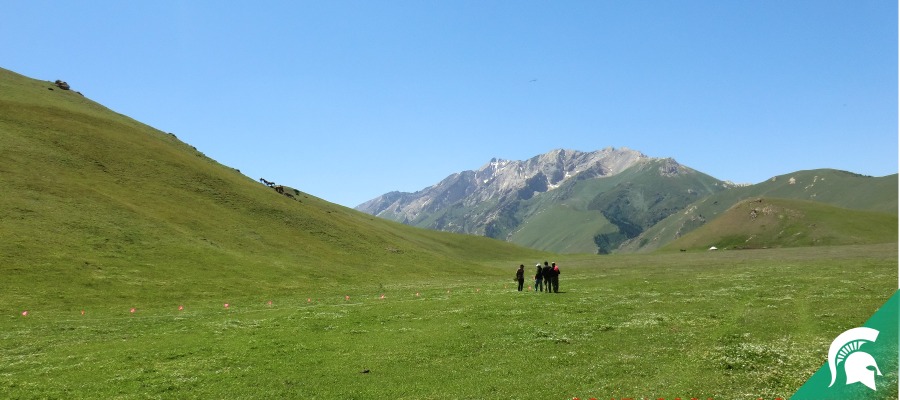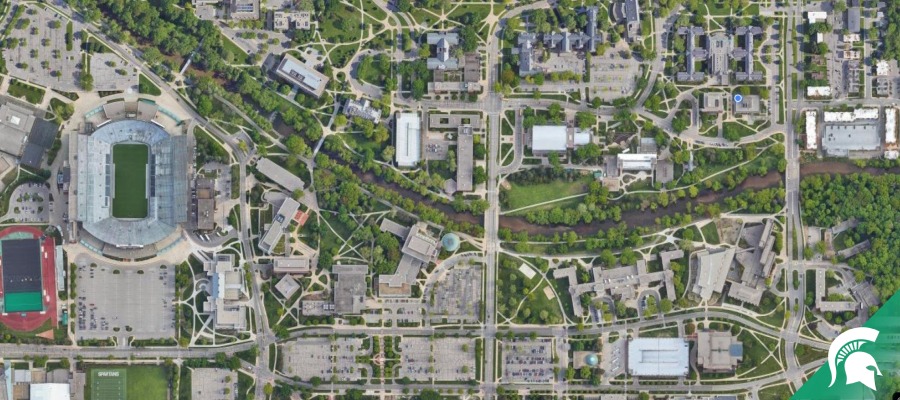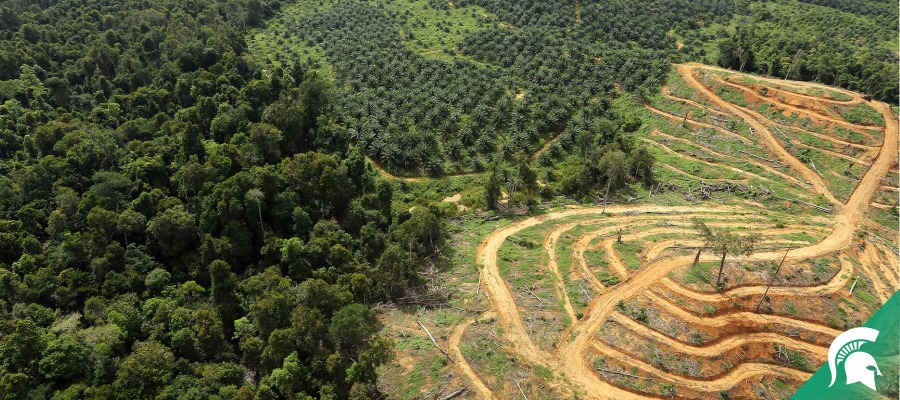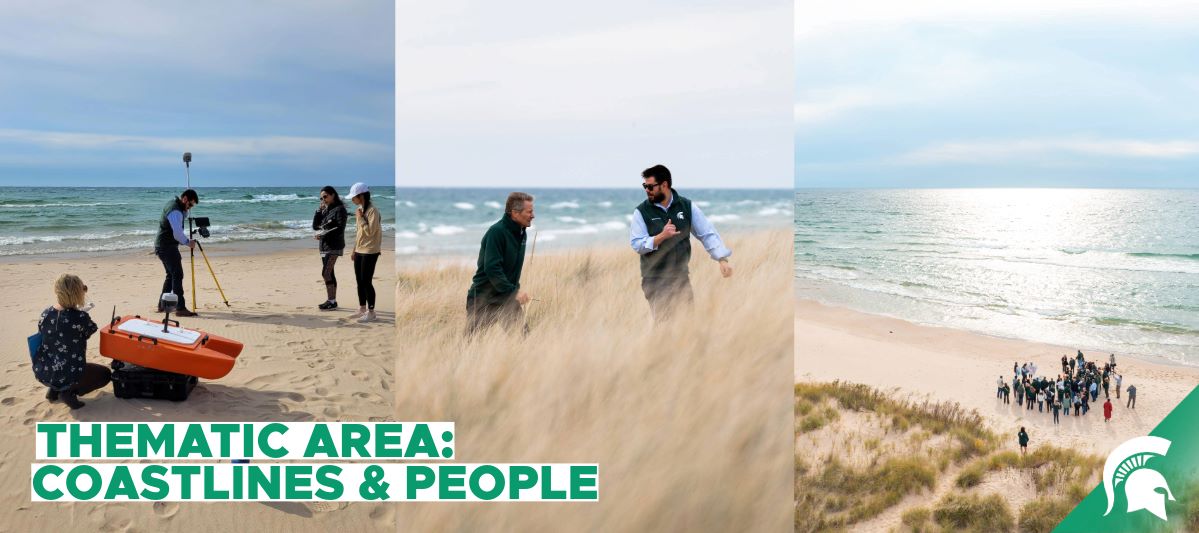Areas of Study and Research
Members of the Department of Geography, Environment, and Spatial Sciences study and conduct research in four general areas: Geospatial Technologies, Nature-Society Studies, Physical Geography, and Urban-Economic Geography.

Physical Geography
Physical Geography includes three main areas of interest: climatology, geomorphology, and plant geography. The climatology group researches a variety of subject areas of atmospheric science, including climate variability and change, synoptic climatology, agricultural climatology, boundary layer meteorology, mountain meteorology, mesoscale modeling, and fire weather.
Geomorphologic research and teaching emphasize the interactions between landforms, soils, and environmental change. Much of the work has a Great Lakes or Great Plains regional focus. Paleoenvironmental reconstruction is a significant component of the research. Research and teaching in plant geography and paleovegetation (fossil pollen and plant macrofossils) studies focus on understanding the nature and patterns of vegetation dynamics of both the present and past.
Areas of interest include:
- Climatology
- Geomorphology and Soils
- Plant Geography

Geospatial Technologies
Geographers are especially concerned with inventorying, representing, analyzing, and understanding real-world places and processes. Geospatial Technologies have developed from this traditional concern, with a particular emphasis on the role of recent technological developments in remote sensing, geographic information systems, global positioning systems, computer mapping, and data visualization. Such technology has revolutionized the way spatial information is acquired, processed, analyzed, and represented, with substantial implications for scientific research and public policy ranging far beyond the traditional bounds of scientific geography.
Areas of interest include:
- Remote Sensing
- Cartography
- Geographic Information Systems
- Spatial Data Visualization and Modeling

Nature-Society Studies
The Nature-Society Studies (NSS) group at Michigan State University investigates how people interact with their natural environment. Such interactions include not only how humans impact nature, but also how nature affects society by enabling or constraining economic activity, demographic mobility, and cultural exchange. Nature-Society Studies have a long history in geography and are of growing importance to the discipline — and beyond — given widespread concerns that the human species is now transforming natural systems on a global scale through climate change, tropical deforestation, desertification, the pollution of our oceans, and urban sprawl.
Areas of interest include:

Urban-Economic Geography
The economic-urban research group offers students the opportunity to become trained in the application of spatial analyses to understand urban problems, determine solutions, and to assess the effectiveness of public policies. Graduate students have the opportunity to work collaboratively on research projects with key urban/economic geography faculty members.
Areas of interest include:
Department Members
For information about individual faculty and student members and their research, please visit our Directory page.
Publications
Faculty members and students publish their research in a wide variety of peer-reviewed journals. For a list of publications, please visit our Google Scholar account.
Coastlines and People Thematic Research Area

The multidisciplinary Coastlines and People thematic area is focused on conducting critical research with a scientific approach to inform policy and management decisions for Michigan's coastal communities while creating a model for other such communities worldwide.
Through a two-year, college-wide process, the College of Social Science at Michigan State University selected several thematic areas to amplify and advance research aimed at addressing some of the most pressing or emerging social problems facing the region, nation, and world. Under the leadership of the Department of Geography, Environment, and Spatial Sciences, in partnership with the departments of Economics and Sociology, the multidisciplinary Coastlines and People thematic area is focused on conducting critical research with a scientific approach to inform policy and management decisions for Michigan's coastal communities while creating a model for other such communities worldwide.
Through this collaborative research program, MSU is quickly seeking to become the leader in understanding and addressing the multitude of future challenges facing our Great Lakes coastal environments, especially those brought about by human activity and climate change. The ultimate goal of this Coastlines and People Thematic Area is to connect science to action and create a Center for Great Lakes Research that will promote the sustainability of our shorelines and the communities that not only cherish but depend on them. To ensure a bright future for these communities and the region as a whole, we must build the capacity and infrastructure required to meet the challenges ahead. With your support, we will.
Spotlight Project: Interdisciplinary Citizen-based Coastal REmote Sensing for Adaptive Management (IC-CREAM)
Researchers from the Department of Geography, Environment, and Spatial Sciences, in partnership with experts from Remote Sensing & Geographical Information Systems Research and Outreach Services (RS&GIS), are working with multiple communities in the Great Lakes region facing impacts from record-high water levels.
Learn More
If you are interested in learning more, please visit https://socialscience.msu.edu/research/thematic/coastlines/index.html
Support & Engagement
If you are interested in supporting the Coastlines and People program, please consider making an online gift today, or contacting Rachel Schmidt, Interim Senior Director of Development for the College of Social Science at rschmidt@msu.edu to discuss additional ways to contribute to this important research.

